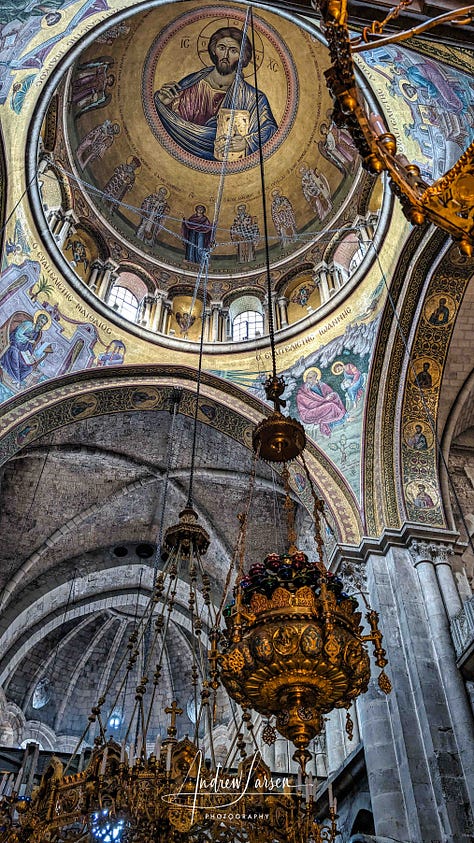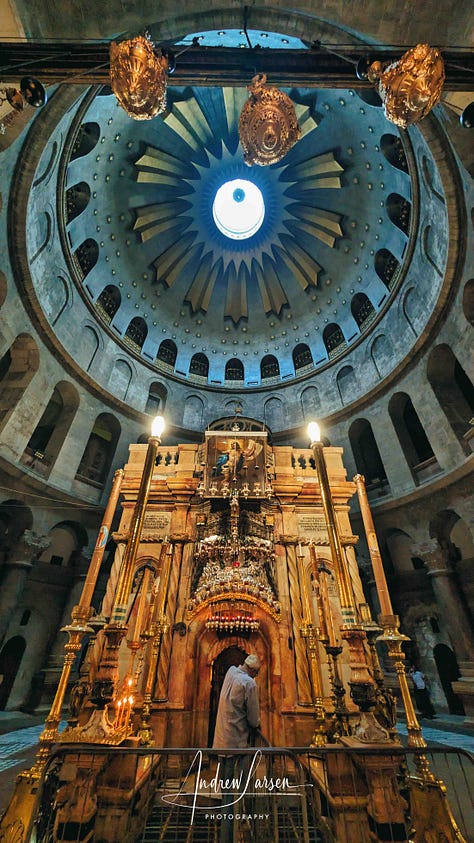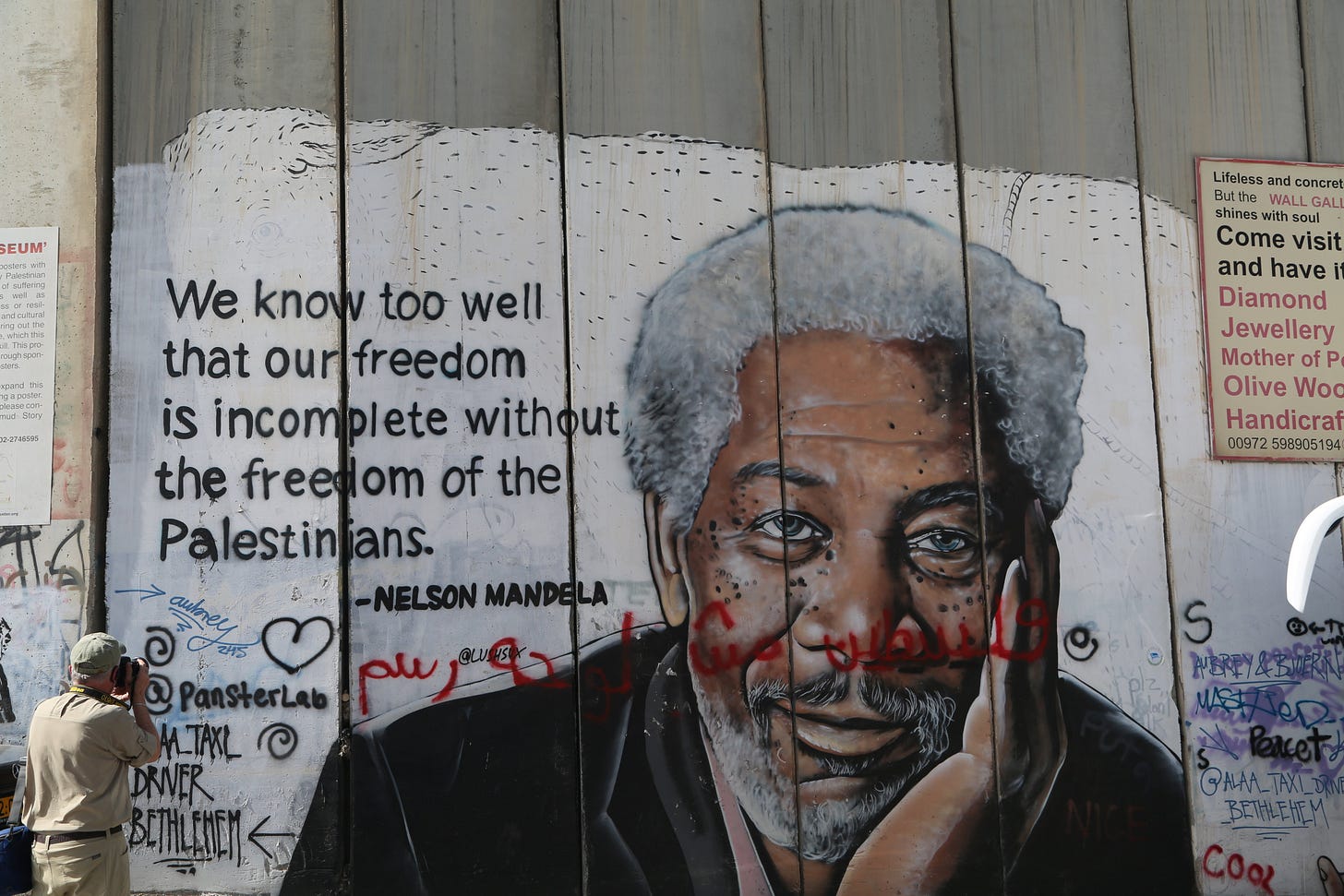"Search Me, O God" — A Sunday Meditation for Monday People
This is my confession. I grew up with this psalm as a personal prayer, but I want you to see with me how it goes deeper—how it invites us into the hardest questions we've been avoiding.
Psalm 139 is one of those passages I memorized as a kid. I prayed it. I loved it.
Search me, O God, and know my heart;
test me and know my anxious thoughts.
See if there is any offensive way in me,
and lead me in the way everlasting.
(Psalm 139:23–24, NIV)
It’s interesting, even our translations have gotten more therapeutic and individualistic over time. The King James Version and ESV just say "know my thoughts"—but newer translations like the NIV add "anxious thoughts." See how we've made this about individual anxiety management rather than the deeper, harder work of examining how our choices as communities have shaped the world around us? We've turned David's prayer into a therapy session instead of a call to justice.
I grew up with this psalm as a deeply personal prayer. And I want to be honest here. Confessional.
Because we read it so privately.
My tradition emphasized personal piety, individual sanctification. We loved the language of the prayer closet in Matthew 6:6—"But when you pray, go into your room, close the door and pray to your Father, who is unseen."
We took Jesus' rebuke of the street-corner prayer as a wholesale ban on anything public about our faith. If it felt social, structural, political? Must be suspect.



My own dad built himself a literal prayer cubicle in his closet. It sat right among his clothes—the work shirts for Monday through Friday, the Sunday best for church. That division in the closet mirrored the split in our theology: sacred and secular kept apart, the spiritual life tidy while the work clothes carried the stains and struggles we never prayed over.
We all have closets like that, don't we? Places we compartmentalize.
You know that old saying: "Think globally, act locally"? We didn't flip it—we split it in half. We created a false separation that let us care about distant suffering while staying blind to how the same systems operated right here. Global concern became our escape hatch from local responsibility.
We were great at World Relief penny drives for Thanksgiving—collecting our loose change so the denomination could send aid somewhere downstream. But we never asked about the systems creating those wounds upstream. We excelled at compassion but avoided questions of injustice. Collect pennies for overseas relief? Absolutely. Ask why people need food aid in the first place, or how our trade policies might be connected? That felt too political for church.
We could pray for persecuted Christians abroad while our church relocations and suburban moves participated in the very systems of exclusion and privilege that create challenges for the others not living in our comfy neighborhoods— everywhere else we weren’t. Our white flight shielded us—shielded my nice little, happy-go-lucky white self—from seeing the connections. Made it easier to go into our prayer closet with the attic window that just looked out on our nice backyard.
We didn't have to find common denominators between our problems and those "over there." We didn't have any problems. That was the point.
Meanwhile, our family joined the wave of white flight—not from downtown Tacoma, but toward the even nicer suburbs. We already lived near University of Puget Sound, which wasn't as rough as downtown. But that wasn't suburban enough. We moved to University Place, where everything was "good": clean, safe streets, great schools with music and sports programs, no "urban blight," no visible "race problem."
Our church made the same move—from downtown to Orchard Street, right next to the nicer Fircrest and University Place neighborhoods. We laid the cornerstone of our new church in 1967—the same year cities burned with unrest and righteous rage over civil rights violations.
But I don't remember us talking about why that unrest existed. I don't remember a sermon on how to respond as followers of Jesus. Maybe they were preached and I wasn't listening well. But if they were preached—they didn't stick.
We prayed Psalm 139 in the prayer closet, asking God to root out personal sins, while stepping over systemic ones we built, benefitted from, or quietly blessed.
We spiritualized faith so much we forgot the people in front of us. We kept it "between me and God" while ignoring entire communities we left behind. We called it "political" if someone asked about justice. We supported wars overseas with flags in our sanctuaries.
But as Amos warned: "I hate, I despise your religious festivals... But let justice roll down like waters, and righteousness like an ever-flowing stream!" (Amos 5:21,24)
Now I See The Pattern—And How to Reverse-Engineer It
This is my confession. This is my journey. And here's what hits me now, with embarrassing clarity:
This is exactly how and why it's so hard to get churches to engage the hard questions of our day—Palestine, racial justice, climate crisis, gun violence, poverty, immigration. We learned to read our Bibles spiritually but not economically, with personal conviction but not communal repentance, privately but not politically.
In my very white church (and please, don't start to talk about cancel culture—don't be so fragile, white friends. If we can't talk about this stuff frankly, we are worthless to the world), we can lead "Holy Land tours" that see the dead stones but ignore the living stones—our Palestinian Christian siblings asking for solidarity. We can have religious pilgrimages that don't see the military checkpoints, home demolitions, refugee camps, and walls.
We can read about climate change as God's judgment while never asking what Micah meant: "What does the Lord require of you? To act justly and to love mercy and to walk humbly with your God." (Micah 6:8)
We can study James 2—"Suppose a brother or sister is without clothes and daily food. If one of you says to them, 'Go in peace; keep warm and well fed,' but does nothing about their physical needs, what good is it?"—while arguing that addressing poverty is "too political" for the pulpit.
We can read Psalm 139 honestly, devoutly, sincerely—but only ever about my private heart, never about our collective heart.
No wonder it's such hard work to get people to listen. To change. To speak up.
Now I see it. Now I see exactly how I've been shaped without even knowing it. How the divide was taught to me so deeply I couldn't see it. Do you see it too?
Dammit. I'm saying it again because it needs saying. This is a raw, unfiltered truth that shouldn't be softened or spiritualized away.
We have to reverse-engineer this entire thing. Take it apart piece by piece. Repent of it. Re-learn how to read our own sacred texts in the light of the world's pain. Because a privatized faith simply doesn't give us the tools to deal with what's out there—the systemic realities that shape whether children live or die, whether families have homes, whether communities have clean water, whether people live in freedom or under occupation.
Because the state of the world—and the lives of countless people today—depend on it.
It's Sunday. But Monday is Coming.
(Yes—I'm riffing on that old sermon: "It's Friday…but Sunday's coming." About hope in resurrection.)
But maybe we need the other question: It's Sunday. But are we thinking at all about Monday?
About how our work-a-day world will look different if Sunday actually mattered? About how what we do in worship changes what we do in policy, in voting, in spending, in speaking up?
What about you? Where have you stayed silent, where have you benefitted from systems you didn't build but moved into, where have you separated your Sunday faith from your Monday choices? Let's talk honestly about how our privatized spirituality has shaped our residential decisions, our political choices, our economic lives.
This is my confession. What's yours?
How did—or does—your faith community mirror this progression? What stories do you carry about what was said—and what was left unsaid?
Do you, or does your church, even ask: "What in the world…am I here for?"
What is your answer?
Maybe it's time to pray Psalm 139 differently. Not just "Search me, O God," but:
Search us, O God.
Search our churches.
Search our budgets.
Search our politics.
Search our silence.See if there is any harmful way in us.
And lead us—if we dare—in the way everlasting.
Dammit. Because the state of the world—and the lives of many people today—depend on it.
If you'd like, tell your story in the comments. Or just sit with the question: What in the world am I here for?
God of justice and mercy, search us. Break our illusions. Uncover our fears. Reveal the ways we've benefitted from injustice, stayed silent, or supported harmful systems—even without meaning to. And lead us—however painfully, however beautifully—into the way everlasting. Amen.





Beautiful post Andy, - as a fellow sojourner leaving our western cult of individualism and the claustrophobic world of WASP imperial religion, I say a wholehearted ‘amen’ - may God grant us the humility, the wisdom and the courage to rediscover and to embrace the gospel.
I am sure you will agree that it is not an ‘either’ ‘or’ gospel, ie - either a deeply personal and individual one, or a communal and global one. To truly change the world, we must be changed within. Without doing our ‘shadow work’, embracing ‘ego death’ and ‘taking up our cross’ daily, we will inevitably become a part of the problem.
I believe in a ‘personal Jesus’ - but in my experience, evangelicalism and Protestantism in general has so constrained and corrupted that relationship that we have created an insular, self absorbed pseudo-spiritual reality where very little light can penetrate - love and truth will always challenge us, expand our horizons in love, and shatter our illusions.
‘It was for freedom that Christ has set us free’ - and that ain’t never ‘comfortable’, for sure.
But, as we learn to trust, it gets more and more exciting.
Thanks be to God.
Beautiful post Andy, - as a fellow sojourner leaving our western cult of individualism and the claustrophobic world of WASP imperial religion, I say a wholehearted ‘amen’ - may God grant us the humility, the wisdom and the courage to rediscover and to embrace the gospel.